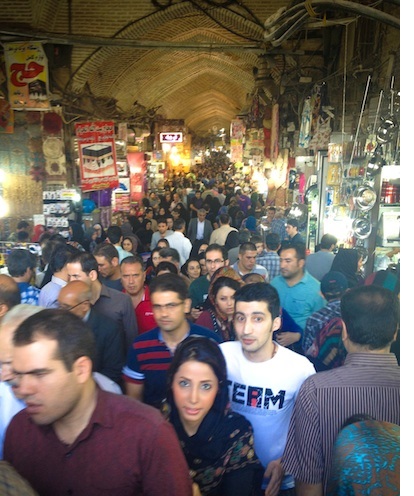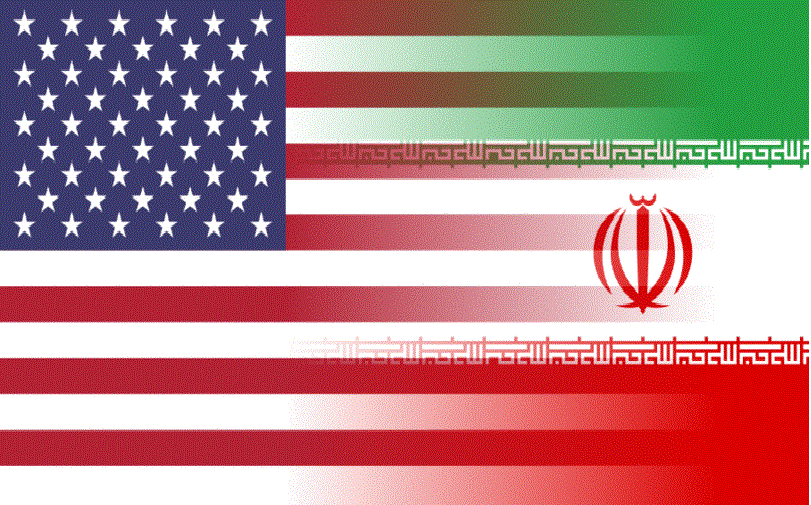Interview with Jim Slattery
Jim Slattery, a former U.S. Congressman from Kansas, visited Iran in December 2014 to attend the “World Against Violence and Extremism” (WAVE) conference, an initiative led by President Hassan Rouhani. He was the first former congressman to visit Iran since the 1979 revolution. Mr. Slattery has been involved in interfaith dialogue initiatives with Iran for ten years, in cooperation with the Catholic University of America, the Peace Research Institute of Oslo, and the Vatican. During his recent visit, he met with senior Iranian officials and discussed the current state of nuclear negotiations between Iran and the world’s six major powers – the United States, Britain, France, Russia, China, and Germany.
You recently became the first former member of Congress to visit Iran since the 1979 revolution. Why did you go? Who did you meet with, and what did you discuss? What did you learn?
I went to Iran because I wanted to encourage the Iranians to issue a strong statement condemning violence in the name of religion, especially Islam. I also wanted to learn more about Iran first hand. I am amazed at how few American decision-makers have any personal experience in Iran. Very few American policy-makers have ever been to Iran and even fewer know key leaders in the Islamic Republic. I share President Eisenhower’s view of people-to-people diplomacy.

I met with high ranking members of the Rouhani Government and key leaders in the Majles (parliament). They do not want to be identified in the American media for meeting with me, although some of their names have already appeared in news stories about my trip. But suffice to say I met with the key leaders. I did not meet privately with the president or the supreme leader, but I met with people who are close to them. President Rouhani gave a speech at the WAVE conference strongly condemning violence, particularly in the name of Islam.
We discussed the current state of the nuclear negotiations. I left with the clear impression that the current Iranian government led by President Hassan Rouhani and Foreign Minister Javad Zarif is deeply committed to getting a deal with the United States on the nuclear issue. I think the Rouhani government is prepared to enter an agreement to forego the development of a nuclear bomb. Such an agreement would be consistent with the fatwa issued by the supreme leader. But Iran will insist on retaining an enrichment capability for peaceful purposes consistent with its view of the Nuclear Non-proliferation Treaty.
The Iranians are very worried the U.S. mid-term election will make it difficult for President Obama to implement an agreement. The Iranians have little confidence that Congress will have the ability to lift sanctions anytime in the near future. The Rouhani government is prepared to be very flexible in dealing with the technical nuclear issues, but they urgently need sanctions relief. The Iranians think their nuclear program is leverage to gain sanctions relief. The United States thinks sanctions are its leverage to persuade Iran to forego the development of a nuclear bomb.

I walked the streets of Tehran freely without fear. Very different than Baghdad. The Iranians I encountered were friendly and interested in the United States. I was impressed with the energy on the streets of Tehran. There are a lot of construction cranes present and the auto congestion is terrible. About every third or fourth car was driven by a woman…Very different than in Saudi Arabia. There were a lot of relatively new cars.
What is your assessment of the mood in Tehran as it negotiates with the world’s six major powers on a nuclear deal?
It is hard to get an accurate measure of the mood in Tehran. Young people and the press I met all seemed anxious to see an improved relationship with the United States and Europe. Keep in mind that 60 percent of Iranians are under age 30, and 60 percent of university students are female. My friends in Iran tell me they are very worried about what they are going to do with all of the educated women! They understand clearly that economic development is key to the stability of the Islamic Republic over the long term.
Some lawmakers intend to introduce legislation that would impose new sanctions on Iran if talks falter. What implications could passing such a bill have on the talks?
It is a bad idea for Congress to pass additional sanctions at this time. This will only complicate the negotiation process while causing Iranians to question further whether President Obama can implement an agreement because of domestic political opposition in the US. The United States is concerned about whether the Supreme Leader will approve an agreement negotiated by Zarif. So both sides have similar concerns. Additional sanctions at this time send exactly the wrong message, and I fear this legislation could disrupt the talks.
What could a deal mean for US-Iranian relations?

A nuclear deal will open the door for immediate cooperation on a long list of critical issues in the region including but not limited to ISIS, Syria, Iraq, Afghanistan, the Taliban, Hezbollah and Israel. Iran would welcome an agreement between the Palestinians and Israel. A deal could also lead to cooperation on oil and natural gas supplies. Iran is a country of more than 70 million people with enormous energy assets and resources with a smart, well-educated population that could become a huge new market for the United States and Europe.
You attended the “World Against Violence and Extremism” (WAVE) conference in Tehran. What stakes does Iran have in combatting terrorism in the region?
Iran is very worried about ISIS and terrorism in the region. We must not lose sight of the fact that ISIS is Sunni, not Shiite. ISIS hates Shiites as much as they do Jews and Christians. Don’t forget that Iran cooperated with the United States in taking down the Taliban in Afghanistan. Iran is going to play a bigger role in the region - given its geography, history, religion, population and energy resources - whether we like it or not. We must engage Iran at this historic time when its elected leadership wants engagement with the West.
Photo credits: President.ir, Tehran bazaar by Maral Noori, Wikimedia Commons
Online news media are welcome to republish original blog postings from this website in full, with a citation and link back to The Iran Primer website (www.iranprimer.com) as the original source. Any edits must be authorized by the author. Permission to reprint excerpts from The Iran Primer book should be directed to permissions@usip.org
 I met with high ranking members of the Rouhani Government and key leaders in the Majles (parliament). They do not want to be identified in the American media for meeting with me, although some of their names have already appeared in news stories about my trip. But suffice to say I met with the key leaders. I did not meet privately with the president or the supreme leader, but I met with people who are close to them. President Rouhani gave a speech at the WAVE conference strongly condemning violence, particularly in the name of Islam.
I met with high ranking members of the Rouhani Government and key leaders in the Majles (parliament). They do not want to be identified in the American media for meeting with me, although some of their names have already appeared in news stories about my trip. But suffice to say I met with the key leaders. I did not meet privately with the president or the supreme leader, but I met with people who are close to them. President Rouhani gave a speech at the WAVE conference strongly condemning violence, particularly in the name of Islam.  I walked the streets of Tehran freely without fear. Very different than Baghdad. The Iranians I encountered were friendly and interested in the United States. I was impressed with the energy on the streets of Tehran. There are a lot of construction cranes present and the auto congestion is terrible. About every third or fourth car was driven by a woman…Very different than in Saudi Arabia. There were a lot of relatively new cars.
I walked the streets of Tehran freely without fear. Very different than Baghdad. The Iranians I encountered were friendly and interested in the United States. I was impressed with the energy on the streets of Tehran. There are a lot of construction cranes present and the auto congestion is terrible. About every third or fourth car was driven by a woman…Very different than in Saudi Arabia. There were a lot of relatively new cars.  A nuclear deal will open the door for immediate cooperation on a long list of critical issues in the region including but not limited to ISIS, Syria, Iraq, Afghanistan, the Taliban, Hezbollah and Israel. Iran would welcome an agreement between the Palestinians and Israel. A deal could also lead to cooperation on oil and natural gas supplies. Iran is a country of more than 70 million people with enormous energy assets and resources with a smart, well-educated population that could become a huge new market for the United States and Europe.
A nuclear deal will open the door for immediate cooperation on a long list of critical issues in the region including but not limited to ISIS, Syria, Iraq, Afghanistan, the Taliban, Hezbollah and Israel. Iran would welcome an agreement between the Palestinians and Israel. A deal could also lead to cooperation on oil and natural gas supplies. Iran is a country of more than 70 million people with enormous energy assets and resources with a smart, well-educated population that could become a huge new market for the United States and Europe.